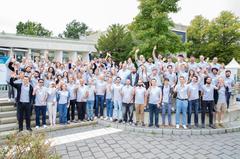The 70 participants of the CERN School of Computing at DESY with tutors. Picture: DESY / Marta Mayer
DESY is proud to host the CERN School of Computing for the coming two weeks. It was opened on Monday by DESY and CERN research directors Beate Heineman and Joachim Mnich, Martin Thomé representing the German Federal Ministry of Education and Research, former CERN Director-General Rolf Heuer, Enrica Porcari, head of CERN IT, and others. There will be a public event on 18 September from 7 pm to which localstudents are especially invited.
“It is great honour to host this year’s CERN School of Computing here at DESY. We all benefit from a lively exchange between science and computing, and it’s important to establish this early on,” says chair of the local organising team and DESY physicist Judith Katzy. “CERN and DESY have a long-standing cooperation in these areas and we look forward to continuing the tradition.”
Since 1970, CERN has organised a series of Schools in Computing. In its 45th instalment, it has come to DESY for the first time. The two-week school is aimed at computer scientists and physicists with a computing interest, and 70 students from 32 countries will be trained by computing experts from CERN and elsewhere in some 50 hours of lectures and hands-on exercises – and enjoy Hamburg for two weeks. Students who pass the final optional exam receive a diploma from the CSC as well as ECTS credits.
The original idea of the school is that experimental physicists engaged in data processing and computer scientists can learn from each other, an idea which is still valid today. High-energy physicists use large-scale data processing applications, which often involves very complex systems and sophisticated techniques that have been developed as empirical solutions to the immediate problems of recording and analysing increasing quantities of experimental data. On the other hand, computer science has made significant progress in clarifying concepts and in making a more theoretical approach to computing.
Today, this idea is implemented with courses covering core computing topics such as software design, security and data management as well as physics data analysis and machine learning.
Students work together, not only to widen their skills, but also to establish life-long links between themselves and research institutes across the world that are likely to be useful throughout their entire career.
Cristina-Andreea Alexe, a student from Romania who is studying at Pisa, says: "The school's lecture programme has an excellent selection of both topics and speakers and it is delivered in an inspiring atmosphere where physicists and computer scientists come together to work and network."
On 18 September starting at 7 pm in DESY’s main auditorium, the school will open for all students to introduce CERN and its research and show the possibilities that exist to take part in this endeavour as engineer or computer scientist. Sign up for it here.








